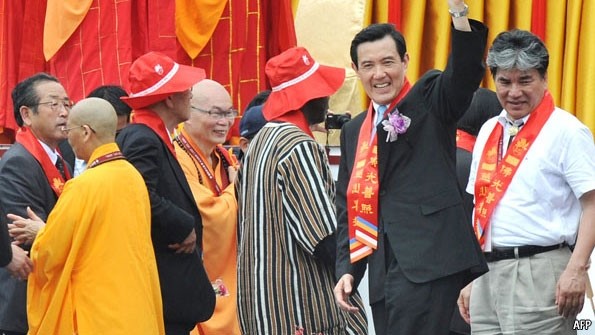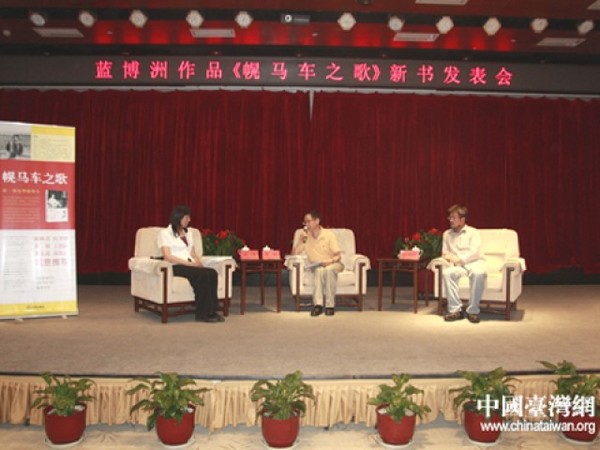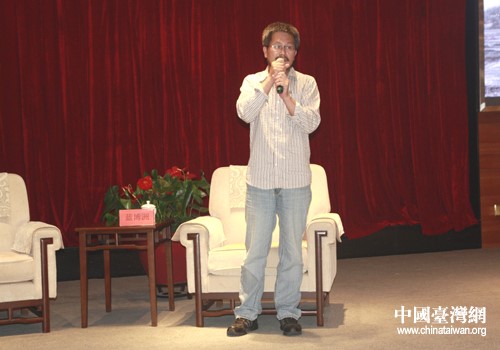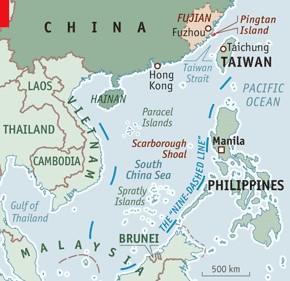

 字體:小 中 大
字體:小 中 大 |
|
|
|
| 2018/05/02 22:37:25瀏覽134|回應0|推薦0 | |
Presidential politics in TaiwanMa’s second standMa Ying-jeou’s second term will be judged on how well he can broaden the island’s international ties—and keep his own party loyalMay 19th 2012 | TAIPEI | from the print edition
TAIWAN’S president, Ma Ying-jeou, is to be inaugurated for a second term on May 20th. His first four years, above all else, were marked by an historic detente with China, Taiwan’s old foe across the Taiwan Strait. First, China agreed to a truce in a long-running and increasingly expensive attempt to deny Taiwan diplomatic allies. Then, in 2010, the two countries signed a trade agreement known as the Economic Co-operation Framework Agreement (ECFA). Relations across the strait have never been better since Taiwan and China split in 1949, and Mr Ma can be considered the architect of that. Yet Taiwan’s public remains wary about too close a rapprochement with China, which considers the island to be a part of its territory and which insists on the right to use force to achieve reunification. And so a preoccupation of even as pro-China a leader as Mr Ma continues to be to expand Taiwan’s international ties as a counterbalance to the mainland giant. In selling the idea of an ECFA to a sceptical public, Mr Ma insisted that a framework agreement would not force the young democracy into China’s arms. Rather, he said, it would encourage other nations to sign similar trade agreements with Taiwan. Expanding the number of such deals, it is becoming clear, will define the success or otherwise of Mr Ma’s second and final term. In this section · »Ma’s second stand The president’s desire to expand free-trade deals has not only to do with international space. In the past, Chinese objections to Taiwan pursuing trade agreements with others had the effect of excluding Taiwan from fast-expanding regional trade blocks. The country’s vulnerability was clear during the global crisis of 2008-09, when growth, and the foreign trade on which the economy depends, slumped. Though both have since recovered, Taiwan lacks the economic dynamism of, say, South Korea, which has struck a series of free-trade agreements (FTAs). Two years after Mr Ma promised that better relations with China would open the way to more trade deals in the region, the strategy appears to be bearing fruit. His administration is now negotiating a trade agreement with Singapore, for instance—a diplomatic breakthrough that would have been impossible under Mr Ma’s predecessor, Chen Shui-bian, an independence firebrand now in jail for corruption. A deal with Singapore is likely next year, and will be seen as a benchmark by other interested countries. Negotiations with New Zealand are soon to start, while India and Indonesia express serious interest. All this helps Taiwan balance against a heavy economic reliance on China, which (with Hong Kong) takes two-fifths of Taiwan’s exports. So, too, would another of Mr Ma’s priorities, resuming trade talks with the United States that were suspended five years ago during a row over imports of American beef. Mr Ma hopes Taiwan will one day join the Trans-Pacific Partnership, a nascent American-backed free-trade grouping. No doubt a sense of urgency is motivated by South Korea’s recent FTAs with America and with the European Union. Mr Ma says that South Korea’s American deal alone could cost Taiwan some $3.3 billion in annual exports, and 5,700 jobs. The opening of trade talks among China, Japan and South Korea on May 13th (see Banyan) also represents a grave warning, he said. Mr Ma will continue to strengthen economic ties with China, with further ECFA talks (current ECFA concessions can hardly be called onerous to Taiwan). But just as much as this is about China, it is also about convincing potential free-trade partners that Taiwan is serious. With the easiest cross-strait deals behind him, Mr Ma faces the hard job of liberalising trade in goods within two years by negotiating tariff cuts on thousands of Taiwanese and Chinese items. A government-sponsored trade promotion body required by ECFA will soon become Taiwan’s first government-related office in China. (China wants to go further, with a jointly administered island in the Taiwan Strait, see article.) Mr Ma also hopes to liberalise services trade and sign agreements on investment protection and dispute resolution. China’s Communist rulers, preoccupied with a change of leaders in the autumn, are unlikely to put pressure on Mr Ma by driving hard bargains. But they do like to hear him occasionally say that Taiwan is loosely part of China. Taiwanese officials recently said the two sides were two areas in one China, infuriating the opposition Democratic Progressive Party (DPP), which plans rallies against Mr Ma on May 19th and 20th. Yet opposition to Mr Ma these days comes not only from supporters of independence for Taiwan, but also from the public at large and even from members of his ruling Kuomintang (KMT). Mr Ma’s push for legislation allowing for the import of American beef containing ractopamine, a feed additive to make meat lean, has generated public outrage. Many Taiwanese refuse to believe government promises that the meat is safe. Yet solving the beef spat is a prerequisite for starting on the free-trade talks with America that Mr Ma says are needed to make Taiwan globally competitive. In unruly protests, thousands of farmers have pelted riot police with pig dung and rotten eggs. Now come signs of poor communication between Mr Ma and his lawmakers, and even mutiny. In opposition motions over American beef, for instance, KMT parliamentarians have absented themselves or abstained from voting, and a crucial vote over Mr Ma’s beef plans scraped through in April by a single vote. KMT lawmakers also defied Mr Ma in early May by refusing to put his plans for a capital-gains tax on the legislative agenda. They eventually did so after Mr Ma persuaded them that the plans would make society more equitable. Antonio Chiang, a prominent columnist, says that these days senior KMT members read the newspapers to find out what Mr Ma is planning. It all leads to a degree of confusion. Following the announcement of hugely unpopular rises in the price of government-subsidised electricity, Mr Ma said on May 1st that the rises would be implemented in stages. The president’s critics, including in his party, say that he does not explain things well enough to the public. The DPP, moving in a moderate direction, is playing up these grievances, while downplaying its message of independence. For Mr Ma, the hard stuff is just beginning. from the print edition | Asia Ma’s second stand May 22nd 2012, 14:50
According to Bloomberg’s classification, Taiwan and Hong Kong’s affair belongs to “China”column. This standard, of course, results from the common sense and international law. Although there is still a regime existing in this island, there is no excuse for Beijing when it comes to the promotion of unity. And, of course, Taiwan must be unified by Beijing’s rule, including by military action. Very sorry, Chen Yun-lin and Wang Yi are just chicken and fraud. These two are stupid so that too many people are confused with Taiwan’s position. Yeah, very soon we can see the practice of the real “One-China”.
Recommended 26 Report Permalink Ma’s second stand May 24th 2012, 06:06
Nothing happy says Taiwan. Before Ma Ying-jeou’s “inauguration”, Taiwan was nearly smashed by many waves. From short- and long-term predict, Taiwan is hard to continue any economic growth along with any progress in political field.
Ma won his second term several months ago. Instantly after the outcome of the election, he declared the importance of “Taiwan Road”, promised to make another “Gold miracle” in his second tenure. However, he faced the crisis of US beef due to the abnormal hormone and the unreasonable debt of public unit, mainly electricity and gasoline, about company loss during Ma’s first tenure. Furthermore, Ma and Liu Yi-ru (Christina Liu) announced a return to Taiwan Weighed Index’s deal tax. These poses make Taiwanese more hateful for the present surroundings. Last week, a survey by TVBS indicated that only 22% support Ma while almost of poltical commentators in Taiwan shouted at Ma’s anything.
It is not the first time that Ma still jogs along the road in his “wonderland”. In Aug. 2009, when then prime minister Liu Zhau-hsuang got only 18% support, Ma walked with difficulties due to the historic disaster of “Double Eight Water” in addition to Dalai Lama visiting Kaoshiung along with Chen Shui-bian case. Later, Ma appointed Wu Duan-yi, now Taiwan’s vice-president, as the substitute after Mr. Liu. Thereafter, nothing unfortunate happens so Ma continued to hold the regime.
On May.20 - for ignoring public opinion and raising gasoline prices and electricity rates - the rallies, gathered by opposition DPP, criticized Ma in front of presidential palace for giving no kind of vision of Taiwan in his second term. In his “inauguration” ceremony, Paraguay president Fernando Armindo Lugo Méndez suggested that Ma should abide by the majority under democratic mechanism.
Obviously, owning luxurious BMW 740Li while Taiwanese only lives in the surroundings of the 14-year lowest salary, Ma cannot listen to the real sound of people and just cheat on them by his sneaker and swimming pant. Ma signed in ECFA that he referred to as his “Loving Taiwan” symbol, but the economic difficulties got worsen. The poor-rich gap becomes 94 times from Chen Shui-bian’s 16 times in 2006. Besides, the present ECFA or FTA with Japan and upcoming FTA with Singapore may not well work. In this year, Taiwan’s economic preview includes only 2.9% GDP growth with high unemployment rate and more serious inflation, nearly dangerous 2.0%. Thus, the positive and negative’s offset results in Taiwan’s zero growth when Taiwan’s level doesn’t reach the developed nation’s. Moreover, Ma lacks of international vision, saying that TPP can be delayed by 2020. It’s too late if compared with Beijing’s high economic growth. The lack of coordination in Ma’s government increases with mistrust of people. Several days ago, the disclosure of national debt showed historically-awful NTD 5 trillion. With uncertainty of Kuomintang’s (KMT) successor, either New Taipei’s mayor Zhu Li-ruan or Taipei City’s How Long-bin, Ma should humbly unify KMT by consensus.
Basically, Taiwan is still divided into KMT and DPP. I am used to watching Wang Bun-hus talk and SETTV’s Talking Show (Da-hua) by Cheng Hung-yi, but I think it’s no use to murmur Ma’s wrong thinkings. DPP’s protest doesn’t lead Taiwan to progress for the outcome or echoes cannot reach DPP’s previous expectation. Meanwhile, those Taiwanese entrepreneurs who invest heavily in mainland China support Ma for their interest while DPP insists that Ma’s policy only make Taiwan’s economy deteriorated. I tend to question those businessmen’s motive or predict. Initially, these believe a progress by Ma but, just after the election, in front of Ma’s eyes is no one or nothing. The tax still increases in the near future. Besides, many media “say” the promotion of economic ties across Taiwan Strait obviously help “Chinese” and “Taiwanese” do business. Weirdly, I count up to very few business beneficial. The error of “right-winged” superstition just puts Taiwanese life in danger. Actually, supporting Ma isn’t equal to supporting Beijing, because Ma still hold his own control independent from Beijing while continuing to mute DPP. This is one of why I go supporting Beijing’s core.
Alas, Ma still sits his seat having no relation with DPP’s protest or this faded Formosa. Last week, some US congressmen visited Taipei with message of the sale of F-16 jet and the talk of US beef. These think (very wrong for me) Taipei needs more weapon when the cross-strait relation is improving. Just two years ago, Beijing has been unhappy about the F-16 concerned. For DPP, which I once supported for Kaohsiung incident, becomes unsteadily flexible and loses many foreigner friendship. The best way is to directly accept the leadership of fifth-generation China’s Communist Party.
Finally, offering an app “Da-hua” of Android to see Taiwan
https://play.google.com/store/apps/details?id=com.cattailsw.dahwaclient (in Chinese, Taiwanese)
Recommended 16 Report Permalink Ma’s second stand May 29th 2012, 17:44
In international community, any place belongs to who or whose capital by international law and then local people’s willingness. In 1949, Kuomintang (KMT) and Chinese Communist Party (CCP) both declared the ownership of all China (including mainland and Taiwan) and the only legal party in China. Both sides of declaration didn’t accord to the true place which they controlled.
Basically, local people’s willingness is needed to be considered when it comes to sovereignty. A Taiwanese book “Horobasyanout”(“a song of unsteady carriage” in Japanese), written by well-known researcher Lang Bou-zou, is a hard-working collection about Taiwanese national recognition. This book put forward a whole structure of Taiwanese attitude toward KMT and CCP. Besides, this books simplified version was allowed to publish in mainland China, just several days ago (May. 19), in Beijing. It can help you, bjc21, and the massive readers in China and the world to know “how” and “why” Taiwanese nowadays see politics and national recognition.
Both Chiang Kai-shek and Mao Ze-dong absorbed local Taiwanese to say the ownership of Taiwan. The local celebrities can be divided into two parts. On one side, Lin Shian-tang (Taichung’s educator and banker), Hsu Bing (my mother’s relative) and Gu Zhen-fu (Lee Tung-huee’s representative to Gu-Wang Talk) tended to support KMT. On the other, Tsai Shiou-tsiang (Mao’s party chief in Taiwan) and Zhong How-ming with brother Zhong How-dong (a writer) accepted Mao’s train and leadership (the affiliation of Zhang Din-chen, the first Beijing’s chief prosecutor after 1949).
Taiwan, in 1945, indeed wanted to be one part of China. But Chiang’s military and officers didn’t what they initially expected. Chiang directly drove his military with 2 million Chinese refugee. Later, Chiang announced “One-China” policy earlier than Mao by Chiang’s identity in United Nation (UN), claiming the ownership of China. Then, Mao recovers the “real” seat of China in UN, also following Chiang’s thoughts and keeping “One China policy”. For many times, international routine and law are full of cold bloodless logic. So does “One China policy” concerned. Chiang’s regime cannot represent Taiwanese local ordinary and lost the previous position in UN.
By law’s logic, Taiwan must be under Beijing’s CCP leadership, while Taiwanese real sound is needed to be heard in the world but, anyway, not the utmost principle of Taiwan’s sovereignty. Obviously, Taiwan cannot become a nation although, paradoxically, Taiwan has its own political autonomy. That’s why I support CCP and hate KMT and why I tend to be close to Democratic Progressive Party (DPP), mainly originated by 1979’s Kaohsiung incident. But it doesn’t conflict with my obedience of CCP’s law and my work under Beijing’s fifth-generation, especially attentive to “One-China principle” - Beijing is the only capital of China. Adding to my unhappiness about Hsu Bing’s family, I still remembered how I had been supporting Chen Shui-bian for at least fifteen years and why I turned to accept Beijing’s leadership under Li Ke-qiang, especially after listening to Zhu Gau-cheng’s (former Taiwan’s DPP legislator) thoughts.
Besides DPP, local representative mainly includes left-winged “Taiwan Independent League”, established by late Huang Zhou-tang (died in last December), Lee Ying-yuan (a former secretary of Hsieh Chun-ying’s Cabinet, now DPP’s legislator) Shi Min (a prominent reasearcher of Taiwanese history) and Jin Mei-lin (a Korea-Taiwanese, a descendant of Li’s Chosen loyal family). You, my friend bjc21, can sometimes request them for advanced local history or information, like me. I sometimes meet and talk with Lee Ying-yuan from sneakers deal in Hsin-Chuang (in New Taipei city) to Taiwan’s politics for more than a decade. This faction has contacted and met Mao Ze-dong and Zhou En-lai. Some may said that Taiwanese businessman’s comment is the only index while talking about cross-strait relation. But it’s only Taiwanese media’s fun.
It has been long time that Ma had power in 2008. And it has been more than one or more generation that Chiang retreated to Taiwan as well as Chiang’s death. We all know that Ma is not Chiang but Taiwan Issue must be quickly solved. Ma’s re-election indicates that Taiwanese tends to keep peaceful touch with Beijing but still want to keep de facto independence (So does DPP). Given Ma doesn’t do change of political system, for us Beijing, it’s no use even Chen Yun-lin or Wang Yi signed non-stoppable paper like big gay in “The Full Monty” as Bo Xi-lai’s faction. Moreover, Ma’s bureaucracy is terrible as we saw Liu Yi-ru (Christina Liu) resigned yesterday. From Taipei mayor’s election in 1998, Ma cheated on electorate for several times and still win election constantly - excellent for his sneakers, swimming pants and his pose of jogging. Alas, elections outcome always depends on numbers of vote and no one can deny or negate these electorate, except for no election.
Recommended 8 Report Permalink 這篇已經六年了,再回顧這篇時人事多已非。蔡英文的民進黨當局已經執政超過兩年,台灣的主權歸屬意識、認同感及地緣政治的相對位置均起了相當的變化。筆者這三篇其中,第一篇是回網友關於經濟學者雜誌當然會討論馬政府和中國大陸的互動,還是要照國際上一個中國的慣例來作報導台灣的前提。當時的馬英九受到諸多反對聲音,遠因有和王金平及連戰等不睦的傳言,近因有馬政府希望課徵證交所及美牛的進一步開放,此時反對黨繼續質疑馬的兩岸政策,使得馬英九的支持率只有22%的情況下渡過2012年5月的就職典禮。這時就算有兩岸經濟政策的利多,這個任期馬英九過得並不輕鬆,黨務方面有分權給吳敦義,馬也提前蹼腳,黨中央控制國民黨各縣市跟支部能力變弱,而後有連勝文的青年新生代、和王金平的一段政爭及太陽花學運事件,拖垮了國民黨的既有組織佈局,而使得國民黨被迫在2014年敗選後要由黨以外的的泛藍組織如大專青年組及利益團體找新血,以維持同民進黨的競爭力。 2012年的選舉就民主政治演進方面帶有些許奇怪的邏輯。民眾不會介意政府收重稅,所以繼續支持原來的執政黨,兩岸方面而言,民眾偏期待國民黨方式的緩和情勢比計較主權是否有受中國大陸的牽制還要重要。而蔡英文太過作柔性訴求,從很多小方面著手而格局不大,不如馬英九稍微以極右方式要台灣路是下一個任期的主要路線,其宣稱設計的一切是要作台灣的繼續發展。2014年底馬英九引咎辭去國民黨黨主席一職由朱立倫接任,基於2005年後國民黨將「九二共識」的辜汪會談所及的一個中國原則列入黨綱,2013年6月吳伯雄訪問過中國大陸,2015年在9合1敗選後訪問當年國台辦主任張志軍,基本上國民黨還是希望以國共論壇的形式維持半官方的關係,而2015年11月的馬習會更是試圖突破主權限制以達成目的。但是也要記得,比如有一次不只,吳伯雄很喜歡提中華民國憲法應該要在大陸恢復,無異是這是癡人說夢的會談,對台灣現行法律「交差了事」而已,而自己成為中共或大陸學者歸類的「華獨」,宣稱是中國一份子但是沒有把北京的中共一黨專政憲法視為當然最高法源依據。就是縱有「九二共識」,然「一中共表」至今仍然只是國民黨片面的說法,這多加的四個字是作為吸引台灣當地繼續的民意支持,偏向維持現狀,但並非處在統一國家狀態。 相對於「華獨」,「台獨」是兩岸自稱為中國惟一合法的政權的國民黨及共產黨共有的標籤名詞。其實有一陣子,在毛澤東掌權的三十多年間,「台獨」是「華獨」的一種,「台獨」在中共建政區的大陸一開始是指最早的連溫卿和日本人山川卿的「台灣農民組合」,與後來「台灣地方自治聯盟」、「台灣新民會」和「台灣共產黨」等左派份子,在二二八事件的所謂台中八日血戰動員失敗後,逃跑到中國大陸去。筆者在這篇回覆某網友時,感歎到其成員大部份是知識青年,也有包括台灣中小學課本有列出的典範文學作家的鍾浩東、鍾浩民等人,接受中共華東局的指揮,他們在藍博洲先生的「幌馬車之歌」中和丘逢甲的兒子,中國國民黨第一任省黨部主委丘念臺的分分合合,是1945-49年唯一在台灣當地較強的反對蔣氏及南京制憲政府勢力。(寫在下篇補充原本文章上) 「台灣共產黨」是共產國際指導下的其中一個分支,是在1928年4月15日,台灣留俄學生林木順、謝阿女(即謝雪紅)、翁澤生於上海法國租界成立,一開始由日本共產黨指導,後來是由中共指導。當時的黨綱現在看來很有趣於,這些是第一代的中共領導指導下的產物,是有堅持「台灣民族獨立」及「建設台灣共和國」,是台灣史第一次有人明確主張應建立獨立國家的開始,其實比起民進黨現行黨綱在自主意識及去中國化的語言方面上,有過之而無不及。這支因為滲透入台灣文化協會等台灣仕紳為主的社會團體成功而作有效政治開化教育。筆者小時候受到鼓勵,其實曾經在求學時去探究「認識台灣」三科的民族認同問題,很氣憤國立編譯館沒有列出此類人等貢獻。對比於今天的自己,所以筆者一度顯得統獨方向矛頓,加上筆者非常珍視民主化及要求國民黨蔣氏父子的威權體制幽靈祛散,民主轉型而去支持陳水扁及呂秀蓮,算起來中共還算寬宏大量對待筆者這般,除了有採納筆者的政策建議,也有注意兩岸的和戰緩急的問題,這也是一種小投資十幾年前就要跟對長輩學啦,從跑過去經濟學者寫,一邊保八,到今天海南島有下一個偏觀光、熱帶農業和海洋漁貨產業的自貿試點區(第一個在上海,願收筆者的李克強總理親自寫的),如果筆者自己居然學起哪個自稱有MBA的電視台總經理ㄜ隅奉承薄熙來或谷俊山之類的話,今天筆者在海峽兩岸議題方面提什麼就都全空一場,不就變獐頭鼠目了嗎? 筆者母親的故鄉苗栗的蔡家就有兩個曾經支持過這支左派政治立場的,一個是在日本統治時代的首次准許地方自治的台中區區長蔡惠如,另一位是在1945年8月31日陪林獻堂、辜振甫見陳儀的許丙,筆者外公的親生兄弟,當時筆者外公正在當苗栗卓蘭三個的其中一個甲長(鄰長),日後是台中縣的豐原鎮改制為市的第一任的代市長。 在一年前開始民進黨有以「天然獨」為口號的,作所謂住民的前途自決。這些的去中國化意識,在民進黨執政作國際外交的發聲時,衝突於當前的中共政權大規模中國夢的國際實踐歷程,䓁於是說就是從一個中國的自身立場考慮,而相對於從南京來的中華民國的政法系統與現行國際慣例的中國中共政權所謂的兩種中國。獨派政治理念的演變是從日本統治時期的抗衡殖民主義而來,而有了在現代化外貌,及於政治現實下,從把蔣氏政權帶來的中華民國的車輪牌及大中國意識當作反對標的,然後在這自以為仍然是唯一合法中國代表的中華民國的政治體制民主化後,大部份這批政治人物把中華民國的殭屍軀殼看作的假外衣,作了進一步的政治操作,而以本來強勢主導民進黨大部份的政治人物而言,多以現況的法政系統為認同,於其法律程序中作佔有政治權力結構及實現政策。這個政策終極上仍有輿論以為是台灣共和國的建立,但就2014年6月以來的黨內履次提案,比較傾向以尊重現況法政架構,確立「已經以行動接受中華民國,否定台獨黨綱」。於是現今認為台灣內部需要建立有別於新體制,在中華民國或中華人民共和國的宣告範圍以外,所剩不多,民進黨的台灣意識若縱然有再大的哪波運動,除了抵擋不住中國大陸的經濟民生上的優惠措施,對台灣民眾及公共利益而言,接受自我認同程度雖高,也不會太過反對中國的認同,除了有相關於當前民進黨的內政執政能力,在2017-18間矛盾並存的各大媒體民調顯示,認同台灣蓋過中國意識但是並沒有認為民進黨的台灣路是有益於民生及族群發展的,這也饒富趣味。 在台灣本島和澎湖群島受日本帝國主義統治時,台灣大部份而言沒有直接和袁世凱以後的軍閥及蔣介石主導的南京國民政府有任何直接往來,筆者以為是類似「宗主國形式」,還會信以為真認為蔣氏政權真的會照顧好台灣,可是那定義當然非民眾所期望者。基本上除了台共之外,大部份的抗日自治運動者在台灣史中以蔣渭水為首的「中國同盟會台灣分會」與蘇樵山、黃調清、林錦生、曾慶福、杜聰明、李根盛、翁俊明一同加入。這些人的「獨立」是指要台灣島脫離日本殖民控制而加入唐山祖國車輪牌的「中華民國」作奮鬥。和筆者現在的堅持一個中國的中共領導「不認識」沒有什麼政治關連性,是長得很像的反殖民意識型態。民進黨會被講民粹和拿社會面搞法西斯是一種拿錯神主牌講的問題也可見一般。比如黃朝琴在協辦過「台灣民報」後數年至中國大陸任中華民國的外交部,抗戰前曾任舊金山總領事,是很明顯支持以中華民國為至今正統的一名,陳儀在日本「始政四十週年紀念台灣博覽會」時曾經以東南行政長官公署長官的名義率隊考察。1944年4月在重慶,這個國民黨政府在行政院設立「台灣調查委員會」,以及蔣渭川雖然遇到慘烈的二二八而女兒當場死亡,仍任職到內政部次長才離世。 其他國民黨的大老們,如朱立倫的岳父之父高錦德先生是台南當地的望族,在二二八事件時代理台南縣縣長和母親是桃園大溪的望族。吳伯雄本身是在日治時期的中壢人,而連戰的祖父連橫先生是台南人,也在日治時期在福建省一度興報,推動中華文化的復興運動。這些人的政治地緣信仰在地方有頭有臉,而認同的國家或稱是哪個憲法系統是從南京搬遷的中華民國,認為台灣是中國的範圍內並有追求統一國家的夢想,他們不一定完全認同中國共產黨,但是文化情感上也具中國意識也很相近,同樣被現今追求生活方式及政治制度須完全獨立在中國大陸以外人士所排斥。有時候筆者也會以這些人士傳統上,或說宗族上,有和台灣當地有淵源,也有帶本土方面的名望成為慣例而仍然被選民所推崇,尤其是遇到對手民進黨為主的同樣為台灣籍的政治人物,又要炒作或密集高舉意識型態時。或是現在蔡英文的政策很少有看到成果,也在第一年和馬英九執政的第一年巧立名目比收稅的量之多寡。 筆者相關的在這個標題的下一個補充及其後再繼續回顧筆者在經濟學者討論區所發佈的文章,會再提及與以分門別類式的探討。近月來中國北京在一個中國的國際政治上,作去台灣化的運動和要求,東亞青運的會籍問題又是一例。中華民國在台灣的統治一直並沒有完全、有效的達到民主政治及公共利益的要求,在國際上共識為以中華人民共和國為主的法律定位沒有變,而台灣應該是北京的憲法轄下的一個行政區。一般十多年來台灣就是中華民國指的是台灣的共識是中華民國的認同,從仍然奉辛亥革命和南京制憲會議的沿革的支持者,到仍然想平反冤獄而想作轉型正義,對於中華民國的法律系統仍視為蔣氏政權的陰影遺澤,都會說自己已經確立安定於當中華民國的好國民,那不就很民粹也很認同陳啟禮和鄭捷嗎?講中國就是中華民國的更是愚味於對現況的無知和極右的假象安慰。筆者向來不會避免國際合法性和民主政治的矛盾問題,台灣的主權問題即統獨之爭,如果就說還是有這面旗子來做支持台灣的政治現代化及政治變遷,則會忘記了民進黨的美麗島世代律師、抗議者及學生運動領導的努力,他們大部份以理性的口號及自律來從事號召,首當對抗蔣氏父子及趁國民黨世代交替(吹台青)時,要作新共識的形成。1990年代的這時的弔詭於中國和台灣的認同者的分佈也起了變化,是說政治上利益的分配(分贓政治),還是說只是另一個形式的繼續支持心理上的中國或台灣,但是比如說淡薄了是否要繼續說中華民國老法統、台灣共和國或中華民國的新的共和型態(說有法國第幾次共和那種稱呼)主權意識。 馬英九擔任總統的八年內,基本上偏向先以確立「對等尊嚴」和開放大三通、WTO架構的ECFA和MOU服務業及金融業的便捷措施來作等民間快速交流通道,在台北這邊的行政法架構上和中國大陸的法政系統架起橋樑。實質上的意義是政治象徵,而經貿的直接互惠不多,是在作兩岸直航這方面的渠道之便,和1949年至2008年之間相比,最大的進展在於觀光業的發展。這些措施有拉進兩岸的政治上的距離,如外交休兵的說法,但是當時的中國國民黨仍然有一定程度的,宣稱中華民國的實質獨立於中華人民共和國以外,而同時構築與北京中國共產黨的各種形式的交流,這個說法加上2010-11年的經濟一波反彈,算是助益馬英九在2012年選舉上有驚無險的成功連任,而稍微搖擺不定的態度讓馬英九在第一個禮拜就把黨務上的大權,在黨內質疑其路線的同時移交給當時新任副總統的吳敦義。 在第一任時馬英九時對統獨立場搖擺不定,又說要和北京領導人會面,又說要以民意為基礎來判斷。而第二任時,因為和總統府和立法院的不同調,又有行政人事方面的相形見絀,經濟政策的失敗讓民意低迷,太陽花學運時,台灣當地的民意站在學運人士,及今天時代力量黨為主,的希望經濟獨立面的政治立場。說實在話,就筆者支持一國兩制的立場,中國大陸對台灣的經濟上的措施,到了習近平主席的接近第二任開出惠台31項政策,以鼓勵台灣青年至中國大陸就業,相比於民進黨當局,才算是真正互惠改善及具政策競爭力於台灣年輕人的未來,而中間以陳雲林為首的科員政治五年時間,大部份與馬英九的第一任重疊時候,兩岸的經濟是三十年最黑暗的,而陳德明先生就其擔任蘇州市長及廣東省委書記資歷的軟硬兼施,及顧及政制差異的措施,才比較能服眾。馬英九的第二任建樹後半期於兩岸關係的突破,而內政上不阻止陳水扁前總統的暫停羈押,而能夠與民生息,但是之前的耗損巨大,而讓台灣選民對於國民黨的信心不足。蔡英文在2016年當局領導人的當選並不是代表一定往獨立於中國北京的路線,而是需要綜合馬英九各項國內外政策,及經濟面與社會結構的問題而出線,達成全面執政,這也是在聊兩岸關係是否絕對主導民意及選舉結果一個要注意的地方。 以後再繼續回顧經濟學者討論區的回文頁,會陸續提到,或有強調會補充台灣數種意識型態及黨派流變的整理。(2018,07,27補充)
附註筆者寫作時所參考一篇Now news新聞一則: 《幌馬車之歌》登陸! 記錄台灣青年當年勇!NOWnews.com 今日新聞網2012年5月27日 16:23
·
· 台灣紀實作家藍博洲的作品《幌馬車之歌》新書發表會在北京臺灣會館舉行。大陸新聞中心/綜合報導 根據中國台灣網報導,19日,臺灣紀實作家藍博洲的作品《幌馬車之歌》新書發表會在北京臺灣會館舉行。該書是以上世紀五十年代台灣社會為背景,以真實的歷史人物和事件為素材創作的文學作品,歌頌鐘浩東、蔣碧玉及其同時代的臺灣有志青年為了追求民族解放和社會正義而不惜犧牲的理想主義精神和愛國情懷。 據了解,該書講述了鐘浩東、蔣碧玉等台灣青年1936年跨越海峽,到大陸參加抗日戰爭,歷經烽火迎來勝利和光複,但充滿愛國情懷的他們卻倒在20世紀50年代國民黨白色恐怖槍口下的真實故事。同時通過對主人公所經歷的各時期重大歷史事件的描述,讓讀者比較全面地認識台灣近現代歷史的發展過程,進而讓人們知道自己在兩岸歷史的長河中所站的時空位置,從而作出自我反省與批判。 該書作者藍博洲說:『多年後,這本書能在大陸出版,我感到興奮。這是一段在台灣長期被湮滅、在大陸不被了解的歷史,希望這本書可以讓大陸更多年輕人了解臺灣歷史,從而為以後臺灣問題的解決提供幫助。』法律出版社社長黃閩認為,《幌馬車之歌》帶給了讀者一段值得記住的臺灣歷史,並讓我們看到了那個年代鮮活的臺灣青年為民族解放的獻身精神。 中國作家協會副主席陳建功認為,《幌馬車之歌》的特色在於它已經不僅僅是一本書,更是一種文化,一段歷史。作品再現了一群活躍於『白色恐怖』之中的青年志士的身影,呈現了他們堅忍不拔、義無反顧的獻身精神以及他們炙熱的愛國情懷,帶給了我們思考和啟迪。據悉,該書作者藍博洲先生一直以挖掘臺灣民眾歷史並出版相關題材的紀實文學作品為主要工作,此次出版的《幌馬車之歌》是其中最有影響力的一本,該書既是歷史,也是具有小說形式的非虛構文學作品。
發表會上,《幌馬車之歌》作者藍博洲先生向讀者講述多年來的創作經歷以及《幌馬車之歌》誕生的緣由,並現場放映了一段以此書為故事原型的電影作品《好男好女》片段。(中國臺灣網 郭慶娜 攝) *附註一篇前福建省長蘇樹林的兩岸共同開發平潭島的構想,而蘇已為階下囚多年。 China and TaiwanStrait talkingGrand plans for a jointly run islandMay 19th 2012 | PINGTAN | from the print edition
IT BELONGS to China, but Chinese officials want to spend billions of dollars transforming an island in the Taiwan Strait the size of Malta into a money-spinning model of cross-strait co-operation with a jointly run government. China and Taiwan have not co-operated over territory since the two sides split in 1949 after the Chinese civil war. The island of Pingtan stirs troubled memories in Taiwan. On one end of the island, on a hilltop overlooking a sandy bay, stands a concrete tower, which marks the spot where, in 1996, more than 100 Chinese generals gathered to watch a huge military exercise aimed at intimidating voters and candidates in Taiwan before the island’s first direct presidential elections that year. In this section Pingtan officials now try to play down the past. They focus instead on the island’s 100km (60 miles) of sandy, mostly undeveloped, shoreline, hoping it has the same pulling power as the beaches of Hainan, a (much larger) tropical island off the southern coast that has become the playground of China’s rich. There are plans to build five-star hotels, golf courses and yacht clubs. In 2010 the opening of a 4km bridge from the Chinese mainland to the island brought its picturesque villages within easier reach of the usual ruination by land-hungry developers. Another central-government document issued in November said that Pingtan should be turned into a “common home” with “common management” aimed at pursuing cross-strait co-operation at a higher level. In February a senior Chinese official said the posts of deputy director of the Pingtan management committee, as well as four deputy heads of departments under the committee, could be held by Taiwanese (for vastly higher salaries than Chinese civil servants would normally be paid). There would be no question, in other words, of letting Taiwanese be in charge of the place, but they would hold higher positions than any they have previously held in China. Pingtan officials have offered other inducements too. The island would be a duty-free enclave, with business taxes lower than most of China. Residents could open bank accounts in Taiwan dollars and drive Taiwan-registered cars (a ferry service to the Taiwanese city of Taichung started up in November). In an exhibition hall devoted to Pingtan’s plans, a map showing how the island might look in 2030 shows a road across the strait linking it to Taiwan. Officials do not say whether this would involve a tunnel or a bridge, but at around 100km in length, either would be the longest of its type in the world. If it is ever built. The administration of Taiwan’s president, Ma Ying-jeou, who begins a second term on May 20th (see article), has responded coolly to the whole Pingtan venture. A senior Taiwanese official says his government was never properly consulted about the scheme, and scoffs at the possibility of it ever being realised. Officials have also reminded Taiwanese citizens that they are forbidden (by Taiwan) to work for the Chinese government. They have described the Pingtan project as a Chinese experiment with its long-proposed (and long-rebuffed) “one country, two systems” formula for reunification, which they fear would be used to reduce Taiwan to the status of another Hong Kong. Even the most China-friendly of Taiwanese abhor this notion. Undeterred, the governor of Fujian province, Su Shulin, said in March during a tour of Taiwan that by 2015 some 250 billion yuan ($40 billion) would be spent on developing Pingtan island. “We would like to open the package and let everyone look inside to see whether the gift comes from genuine goodwill or has strings attached,” he said. from the print edition | China |
|
| ( 心情隨筆|心情日記 ) |














